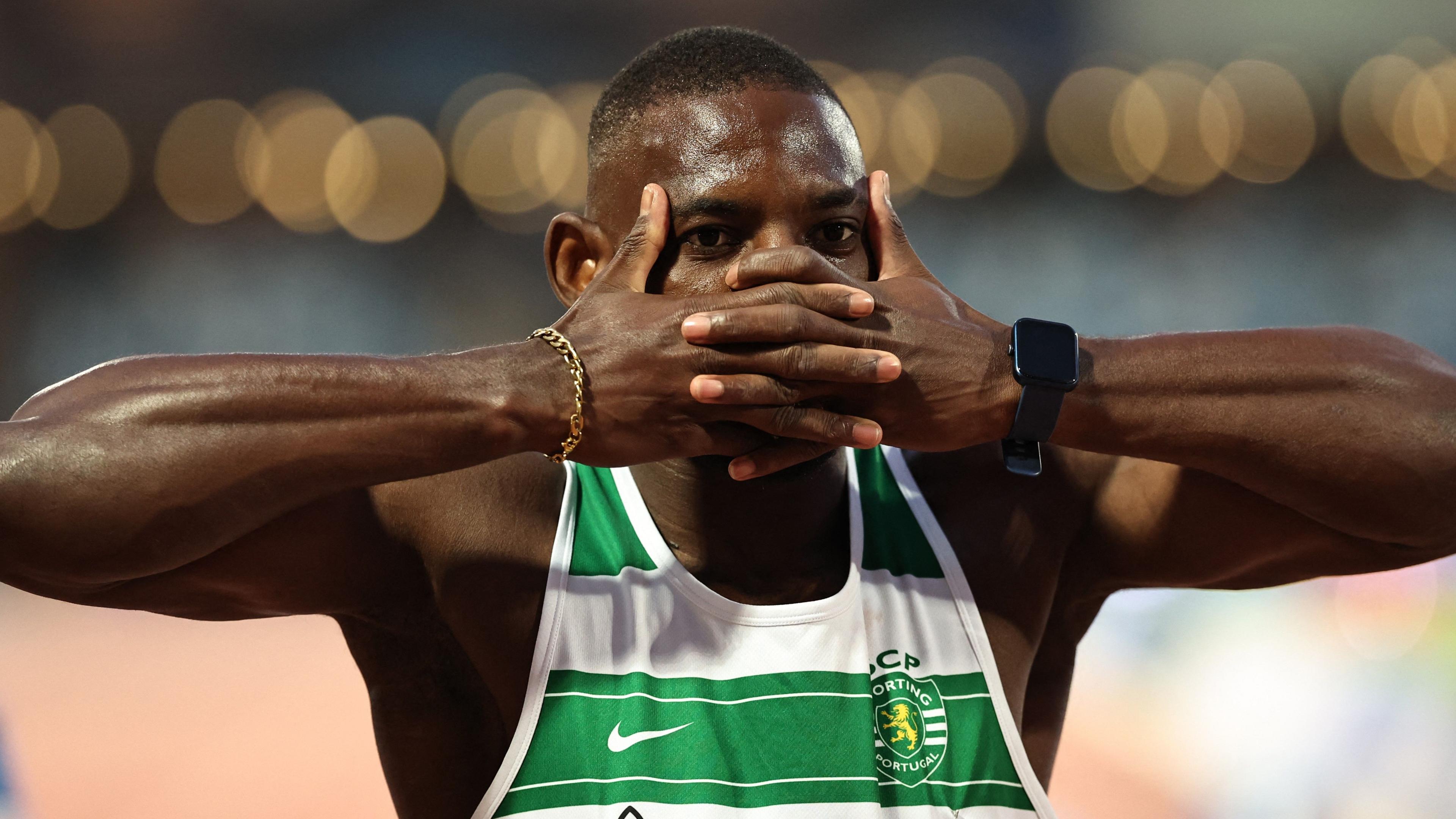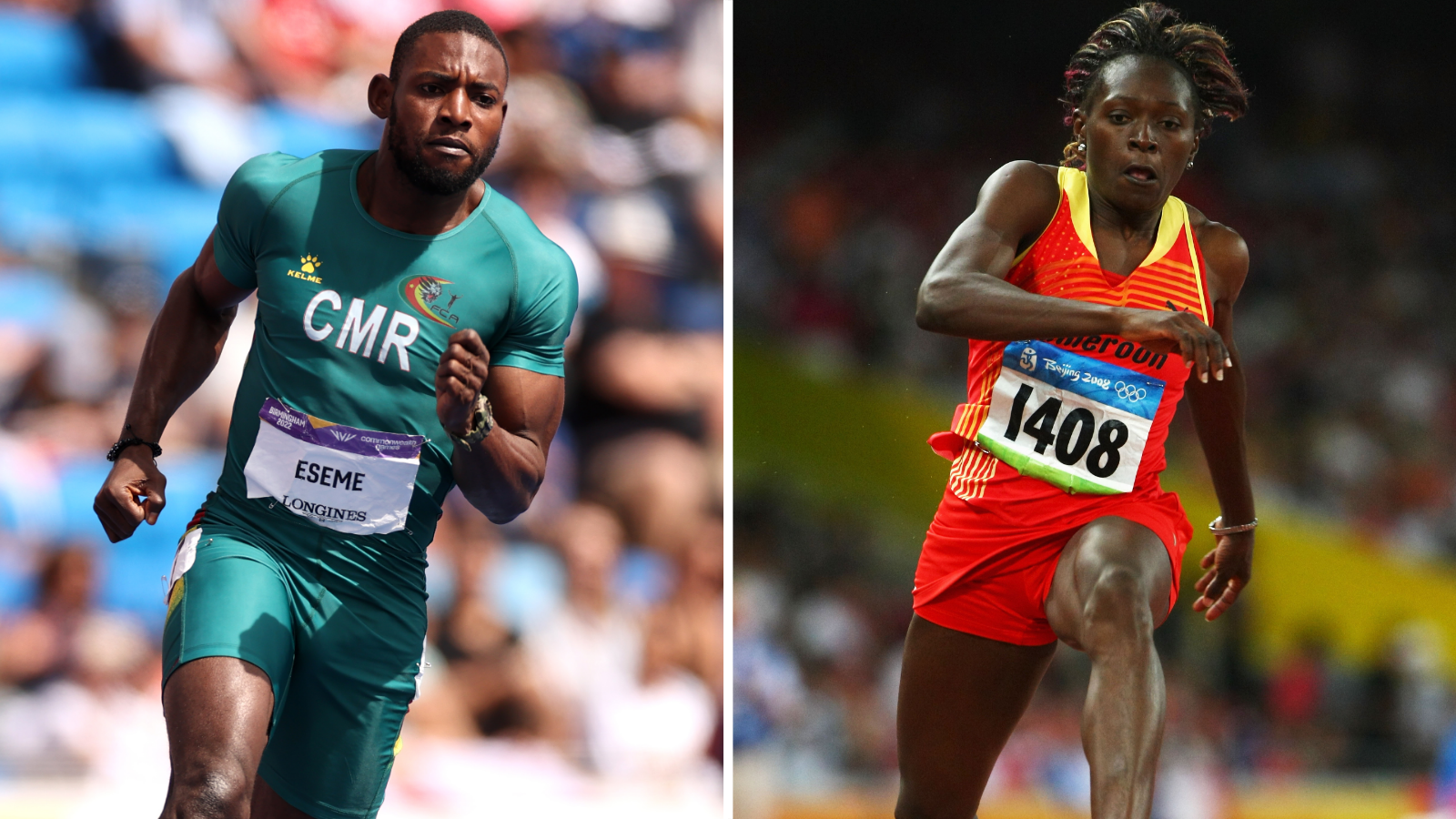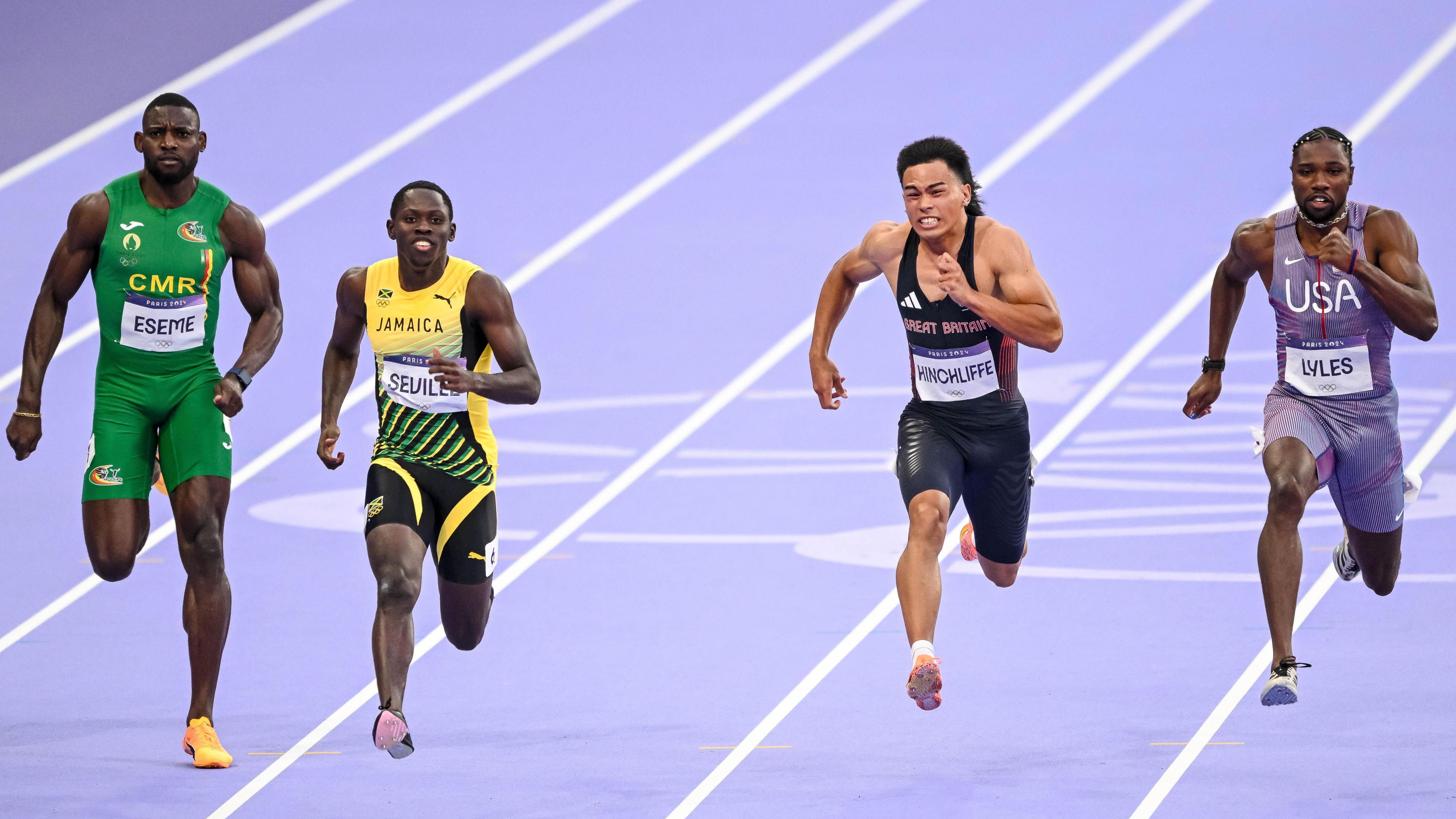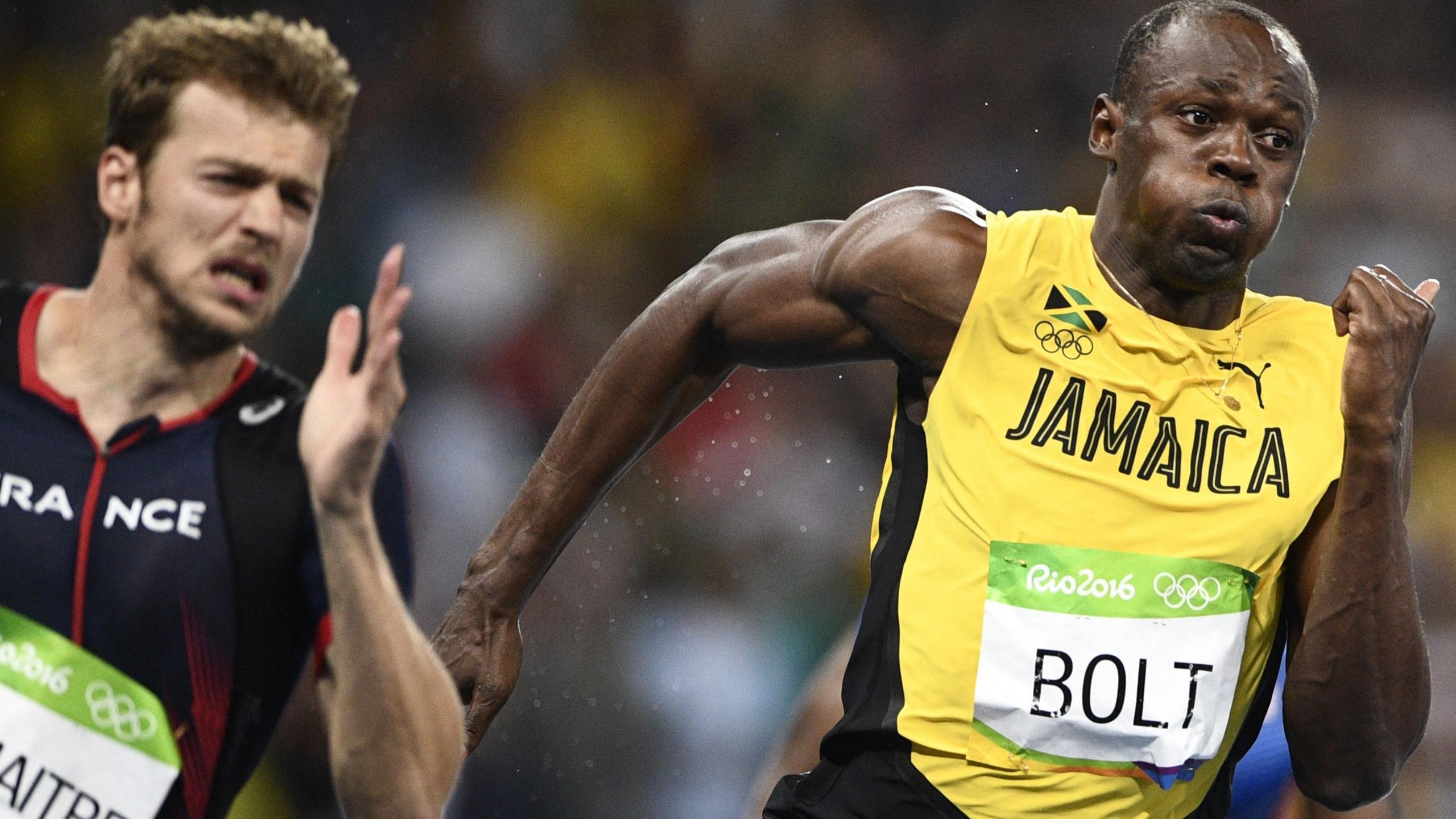Africa's sprint 'pirate' who celebrates like Arsenal's Gyokeres

Emmanuel Eseme decided to copy Viktor Gyokeres' goal celebration after moving to Portugal and watching the Sweden striker play in the same green and white kit of Sporting CP
- Published
Emmanuel Eseme is not your usual world-class sprinter.
A former amateur footballer who played in goal, the Cameroonian did not switch to athletics until he was 24.
Now 32, he has spent most of the intervening years balancing sprinting with his job as an environmental engineer.
He is currently based in Portugal having joined Sporting CP, most famous for its illustrious football team but a multi-sport club which Eseme represents in meetings wearing its famous green and white striped kit.
He has even adopted the celebration of one of its former players, copying the mask made by Viktor Gyokeres,, external which sees the Arsenal striker cover his mouth with interlocking fingers after he scores.
"I liked the way he played. He was strong, very determined," Eseme told BBC Sport Africa.
"I didn't know the meaning of his mask, but then I decided to give a meaning.
"[It] looks similar to the pirate mask. And when pirates go somewhere they change the happenings of everything, and I believe that's what I'm doing in athletics.
"I'm going there as that pirate, that game changer."
Eseme was "really happy" to receive a video message from Gyokeres, external congratulating him on qualifying for last year's Olympics in Paris.
"It just motivated me to keep on going harder," he added. "To be able to represent the mask."
With Eseme currently preparing to represent his nation in both the 100m and 200m at his third World Athletics Championships in Tokyo, he is hoping his achievements - which have made him a household name in Cameroon - can be a game changer for athletics in his homeland.
Portugal to Premier League - how will Gyokeres fare?
- Published27 July
Building on Mbango's golden legacy

Eseme believes there is "potential" in Cameroonian athletics, but is worried that young people no longer remember Francoise Mbango's Olympic triple jump gold medals won in 2004 and 2008
Only one Cameroonian athlete has ever won a medal at the World Championships, with triple jumper Francoise Mbango claiming silver in both 2001 and 2003.
Combined with her Olympic gold medals from Athens 2004 and Beijing 2008, she remains a hero to many.
But Eseme is worried about the subsequent lack of international success which now stretches over nearly two decades.
"The problem is it has been many years since she [Mbango] registered that performance and young people don't really know what she has done.
"Society has forgotten about athletics as a sport that can bring a lot to the country."
Eseme, who recently became a father, spoke to the BBC after training at the Olembe Stadium in the Cameroon capital Yaounde, a multisport complex initially built to host matches at the delayed 2021 Africa Cup of Nations.
While football still dominates in his home country, he says the infrastructure available to athletes has improved, allowing greater consistency.
"Before I went to Europe, I had that kind of a problem," he said, explaining how football could previously block his access to facilities.
"Today we have more than one track on which we can train."
But Eseme believes more can be done, particularly around training coaches.
"We have a lot of coaches who are passionate about the sport. I think we just have to give them that possibility to dive deeper.
"And we should also introduce sports medicine in Cameroon.
"It's one of the parts of my training in which I spend so much and I think that's what's really helping me to progress."
While Eseme does not enjoy being recognised out in public - often wearing a hoodie and cap to avoid being spotted - he is happy to be a role model.
"If I had started earlier, maybe Cameroon would have been talking of an Olympic champion, the world champion," he said.
"So that's what I'm trying to inspire into the younger generation - start right now.
"If you don't dream big you never go anywhere."
The Africans to watch at the World Athletics Championships
- Published11 September
World Athletics Championships - everything you need to know
- Published10 September
'I believe Africa is going to take over'

Eseme finished fourth in his 100m semi-final at the 2024 Paris Olympics, missing out on a place in the final by 0.07 seconds.
Eseme's season so far has been mixed, having missed the indoor campaign through injury.
He then recorded top-six finishes in the opening four 100m races of the Diamond League calendar, clocking a season's best of 9.99 seconds in Rome, just short of his personal best time of 9.96secs.
In July, he recorded a new national record in the 200m, but injury has again curtailed his ability to race properly since that point.
"I've been training, though not in full force," he admitted.
"But I still have goals for Tokyo. I want to represent my country as best as I can."
Having suffered with injuries and visa issues around other global showpiece events, he admits that he has found it tough to deal with the setbacks.
"I was really affected," he said, before also confessing that he worries people will think "he is just faking it because he's scared".
Someone who might offer support is South African sprinter Akani Simbine, the former African 100m record holder who has agonisingly finished fourth in the past two Olympic finals.
"Sometimes, when I have some doubts, he's always there to [say] 'OK, this is how it works'," revealed Eseme.
"He's the one who held my hand and showed me the way things happen in the athletics."
Simbine did win a silver medal at last year's Games in Paris as part of South Africa's 4x100m relay team, a feat matched by Botswana in the men's 4x400m.
With 10 African men reaching the semi-finals of the 100m in Paris - including Letsile Tebogo, who would go on to win 200m gold, Eseme is convinced African sprinting is on the rise.
"I believe Africa is going to take over," he said.
"With everything that's happening with Tebogo, Akani, we are seeing that it's possible to achieve all those things."
And despite his age, Eseme believes he can be part of the revolution.
"A lot of my opponents have been doing this sport for 15 years. I've been doing track and field for eight years," he said.
"I may not be young, but in terms of the work the other athletes have undergone, the work their muscles have undergone, I believe my muscles are still fresh and I'm still growing progressively.
"The Jamaicans, Americans, South Africans, they are not from space. They are not super-humans.
"If they are able to do it, I believe I am able to do it too."
Related topics
- Published14 May 2024
